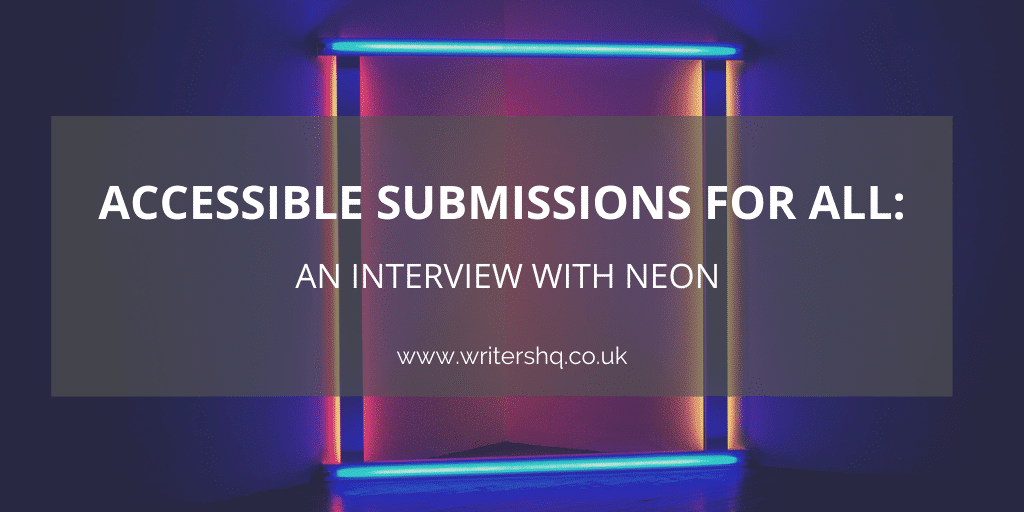As part of our Accessible Submissions For All campaign we’ve been interviewing literary journal editors and writing competition administrators to see the different ways fair, accessible submissions can be managed, and the challenges the lit community faces in the current system. You can read more about our drive to encourage a fairer, more equitable system for submissions and publishing here.
We put some questions to Krishan Coupland, editor at Neon – an excellent example of a top quality literary journal providing accessible subs and a long-standing fave at WHQ.
INTERVIEW WITH KRISHAN COUPLAND – EDITOR OF NEON

What is Neon’s model for fees/payment and how has it changed over the years?
At the moment we pay on a per-word basis for prose, a per-line basis for poetry, and a per-image basis for comics and photography.
We used to pay an equal royalty to every contributor based on issue sales, subscriptions and donations. This worked well in some respects. For example, it meant that payments automatically scaled as the magazine grew. On the other hand, it required a lot of admin, and meant that writers didn’t get paid until long after they’d been published.
Our current model means that people are paid quickly, and also allows us to be more flexible; we can include more writers in a given issue without “diluting” the royalty share, for example.
Can you give us an idea of the running costs/time involved in running a lit mag? Are you able to pay/reimburse yourself, or any readers/administrators?
It’s difficult to be exact about the time it takes, but it’s a lot – probably equivalent to a part-time job. For many years I couldn’t pay myself at all, but I can now… and doing so has actually been fundamental in helping the magazine grow. When I couldn’t pay myself it was a hobby, and had to take second place behind actual work. Now I can justify spending more time growing and promoting the magazine.
As a writer, how do you feel about entry fees and payment?
My instinctive reaction to entry fees is a negative one. At the same time, though, I recognise that entry fees are what allow some publications to pay their writers… and most competitions to exist at all!
And payment… I feel that publication should first and foremost be a good deal for the writer. Payment is part of that, but there are times when other things matter more to me. I’ve preferred publishing my work in non-paying markets before because I knew they’d really champion it, or because I knew it’d be read by a lot of people. Those things matter far more to me than payment – at least, when it comes to my literary writing.
With the current lack of external funding, how can we make the lit mag community more self-sufficient? (Or do you think there needs to be more investment by larger publishers/organisations so the onus is less on editors/writers?)
I would love for there to be more funding for literary magazines. If we want a rich literary culture we need to invest in it. It’s a circular thing; meagre investment in literary culture means that literary things remain very niche, which in turns makes it harder to justify funding them, and so on.
Of course, I can’t control how arts funding gets put to use. So the question of self-sufficiency is more interesting to me.
How can we make literary magazines more self-sufficient? I think it might help to change how we think of literary magazines. If we consider a lit mag to be a community rather than a publication… or if we experiment with medium and format and distribution network… we can greatly increase our options for self-sufficiency.
What are some ways writers can support lit mags?
Buying and reading lit mags makes a huge difference, but it’s not the only way to support a magazine. Many mags have free content online. Sharing this, commenting on it, or taking a moment to engage with the featured authors – all of these things are incredibly valuable.
What are some ways that literary mags/competitions can make it easier for low income/marginalised writers to submit?
I’m a huge advocate for pay-what-you-can models for selling art – not just for literary magazines but for everything. I think this kind of model can be applied to submission fees as well. No organisation is in a position to accurately judge whether a set fee is reasonable to an individual person… so let each individual person set their own reasonable fees.
I also think it’s important to make guidelines as clear and simple as possible – that’s something I’m always working on with Neon. Overly complex guidelines don’t help anyone.
Why/do you think it’s important for lit mags/comps to be more accessible?
Literary things are already pretty niche, so it just doesn’t make sense to me to also exclude a whole slew of people by being inaccessible.
Enormous thanks to Krishan Coupland and Neon for these insights into the workings of their lit mag. If you enjoyed this interview, please do take a minute to go read some of the great work published up at Neon (or some of Krishan’s own writing), submit your own stuff, and keep spreading the literary love…





